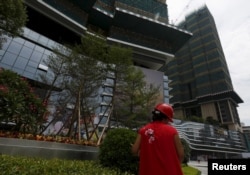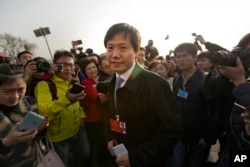China's rich are defying the country's economic slowdown, growing their personal wealth at an astonishing pace and moving money abroad. Capital flight has continued, despite checks and the government’s efforts to bring back funds transferred out of China.
An additional 65 business people have entered the Forbes’ China Rich List this year, highlighting the rise in the number of billionaires in the face of the country’s economic slide. Forbes recently said the wealth of the 400 listed members rose 14 percent, which is more than double the 6.7 percent growth seen in China’s gross domestic product.
Rupert Hoogewerf, chairman of consulting company Hurun Report, said mainland China has more billionaires than the United States, which has a total of 535. There are 594 billionaires in mainland China, and an additional 94 in Hong Kong, Macau and Taiwan, he said.
Hurun’s China Rich List of individuals with a net worth exceeding $300 million saw 179 people added this year to the list of 2,056 millionaires.
“Despite the overall economic slowdown in China, a lot of industries are prospering. This is particularly true of the IT sector, which has high valuations of 50-60 times their earnings,” Thomas Gatley, chief corporate analyst for Gavekal Dragonomics, said in explaining the rising number of billionaires.
Analysts look at stock prices of listed companies and work out potential values of unlisted firms before arriving at the net worth of company owners.
“Personal wealth is measured by an individual's paper value, growth in the value of their homes, bonds, or stocks,” Scott Kennedy, deputy director of the Freeman Chair in China Studies at the Center for Strategic and International Studies, told VOA. “China’s housing bubble is certainly a source of inflated paper wealth for many Chinese, including real and potential billionaires.”
Kennedy said, “China has an $11 trillion economy, and it is growing by 7 percent annually. That means in 2016, it will add an additional $770 billion to its economy. Certainly, that is enough new wealth to create a few more billionaires.”
Westward moves
The growth of wealth in a few hundred individuals and families has resulted in massive capital flight.
Christopher Balding, an associate professor of finance and economics at Peking University HSBC Business School, estimates $1.6 trillion slipped out of the country in the past four years — a bulk of it by owners of businesses intentionally paying more for their imports than needed. A portion of the money sent out for business-related purchases finds its way back into accounts of business people, he said.
This is evident from the discrepancy between what banks lent for imports, and customs data showing the value of actual imports. Banks lent $700 billion, while actual imports in customs' records were worth $600 billion in May this year, he pointed out.
“International air travel by Chinese is up 30 percent. This includes many people who go abroad to open bank accounts,” he said, adding, “The anti-corruption drive is making people take the money out of the country, and leave.”
Official crackdown
Gatley agrees the anti-corruption drive is one reason wealthy Chinese buy property overseas, but not the most important reason. They are driven mainly by the need for diversifying investments to reduce risks and to support foreign education of their children, he said.
Analysts said investment in foreign property and companies are signs some wealthy Chinese are planning to migrate abroad. Many Chinese are known to be buying residence permit and citizenship for their children in certain countries, including in Europe, where it is available against investment of $500,000 to $1 million.
The government has also intensified its efforts to get back what Beijing regards as “stolen wealth” taken to foreign locations by corrupt officials and businessmen who migrated in the past.
China has achieved some success, with Australia agreeing to consider Chinese requests for repatriation of people and money that have come from China, and the United States allowing repatriation in one recent case.
Kennedy said, "... those seeking to illegally move funds have the benefit of China’s massive size and assistance from a bevy of bankers, investors, accountants, and lawyers,” adding that parts of the global financial system are opaque and difficult for regulators to penetrate.
Property buying
In another survey, Hurun found 60 percent of high net worth individuals, who have assets worth $1.5 million or more, want to invest in property overseas in the coming years. They are particularly attracted to the property market in three U.S. cities: Seattle, Los Angeles and New York.
“China currently has 1,340,000 high net worth individuals. That means we are looking at a massive 800,000 individuals who want to buy property overseas over the next three years,” Hoogewerf said. “Prices in major Chinese cities have risen so fast in the past year that an overseas house seems to offer good bang for your buck.”







